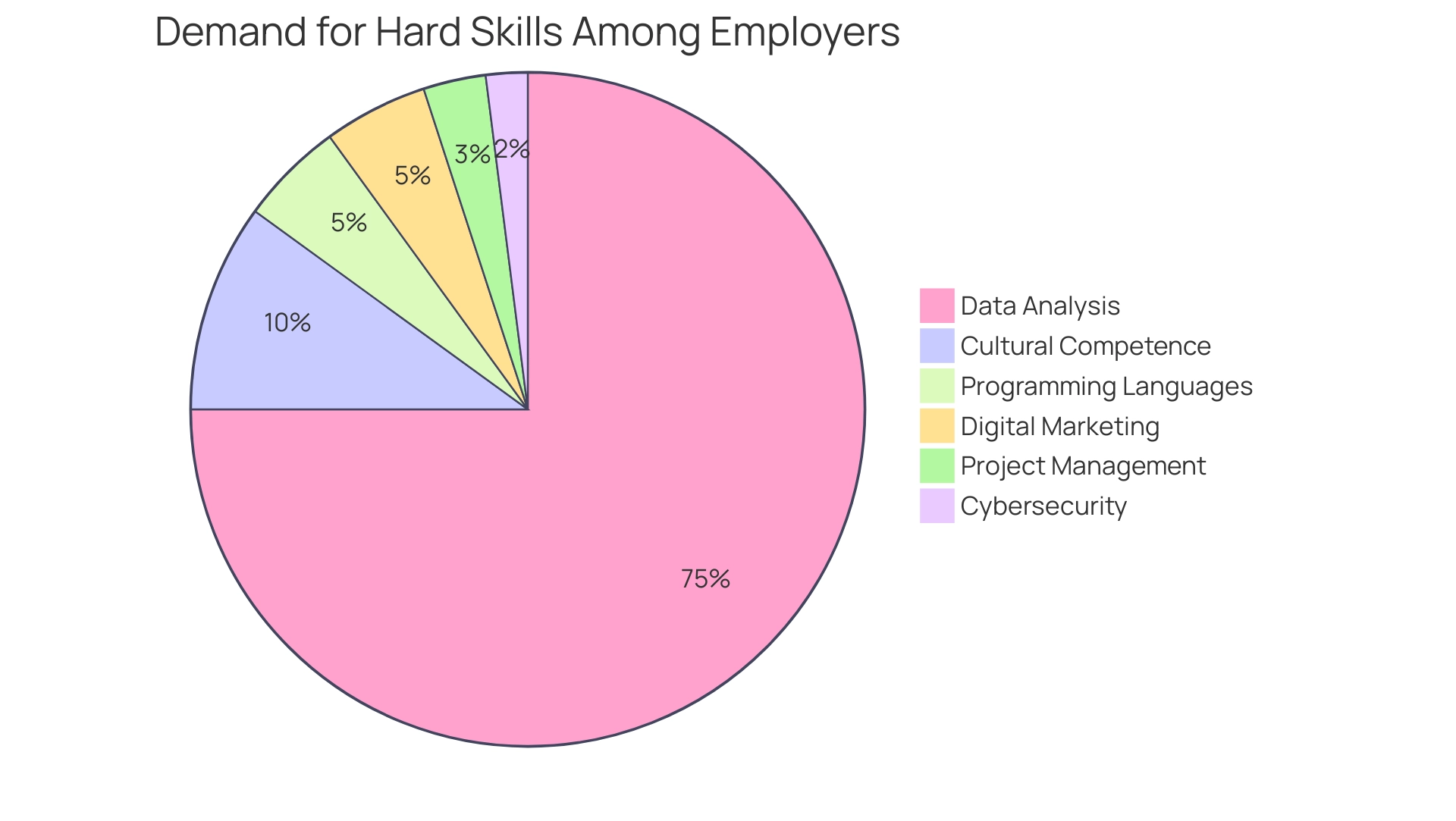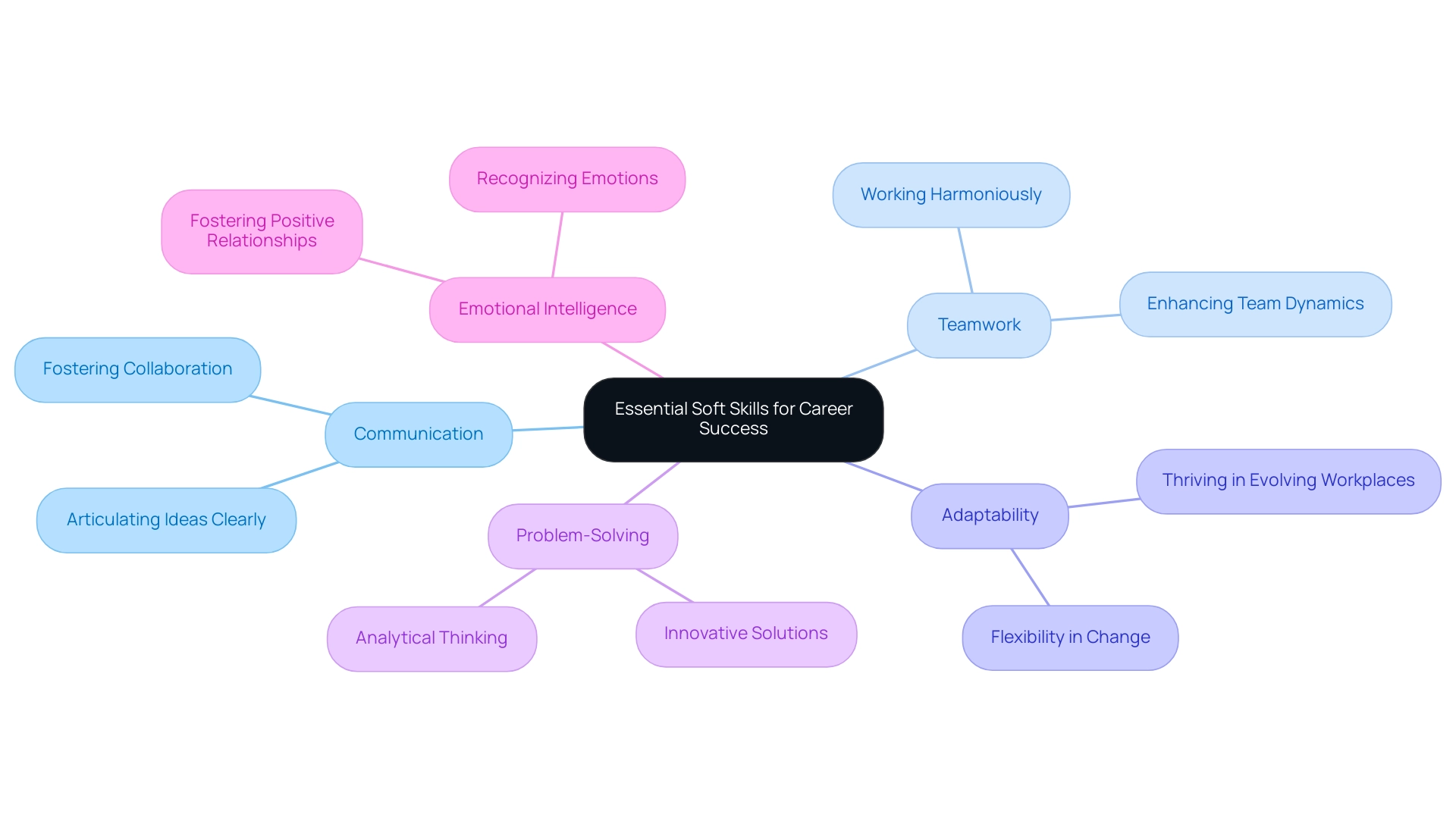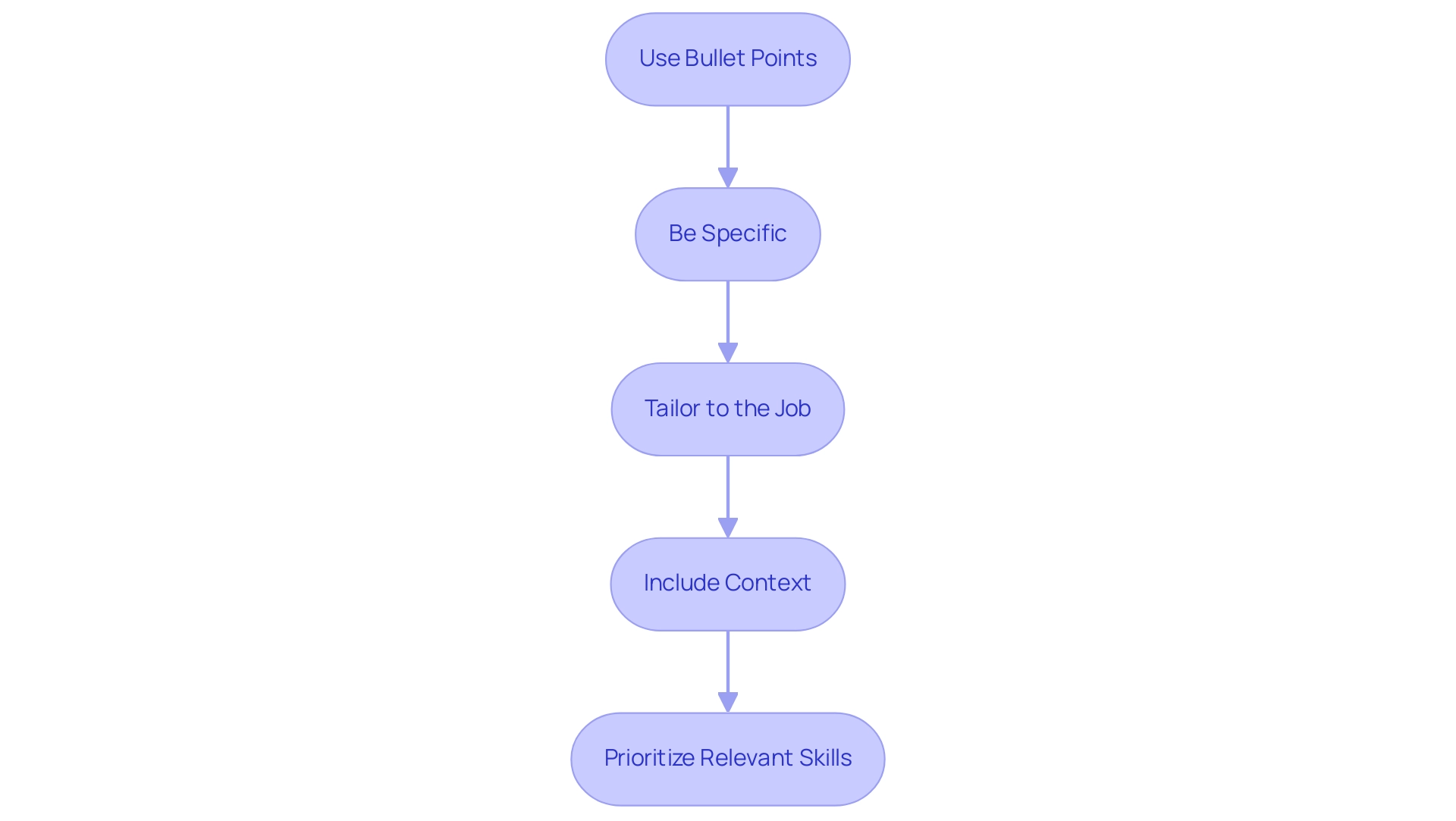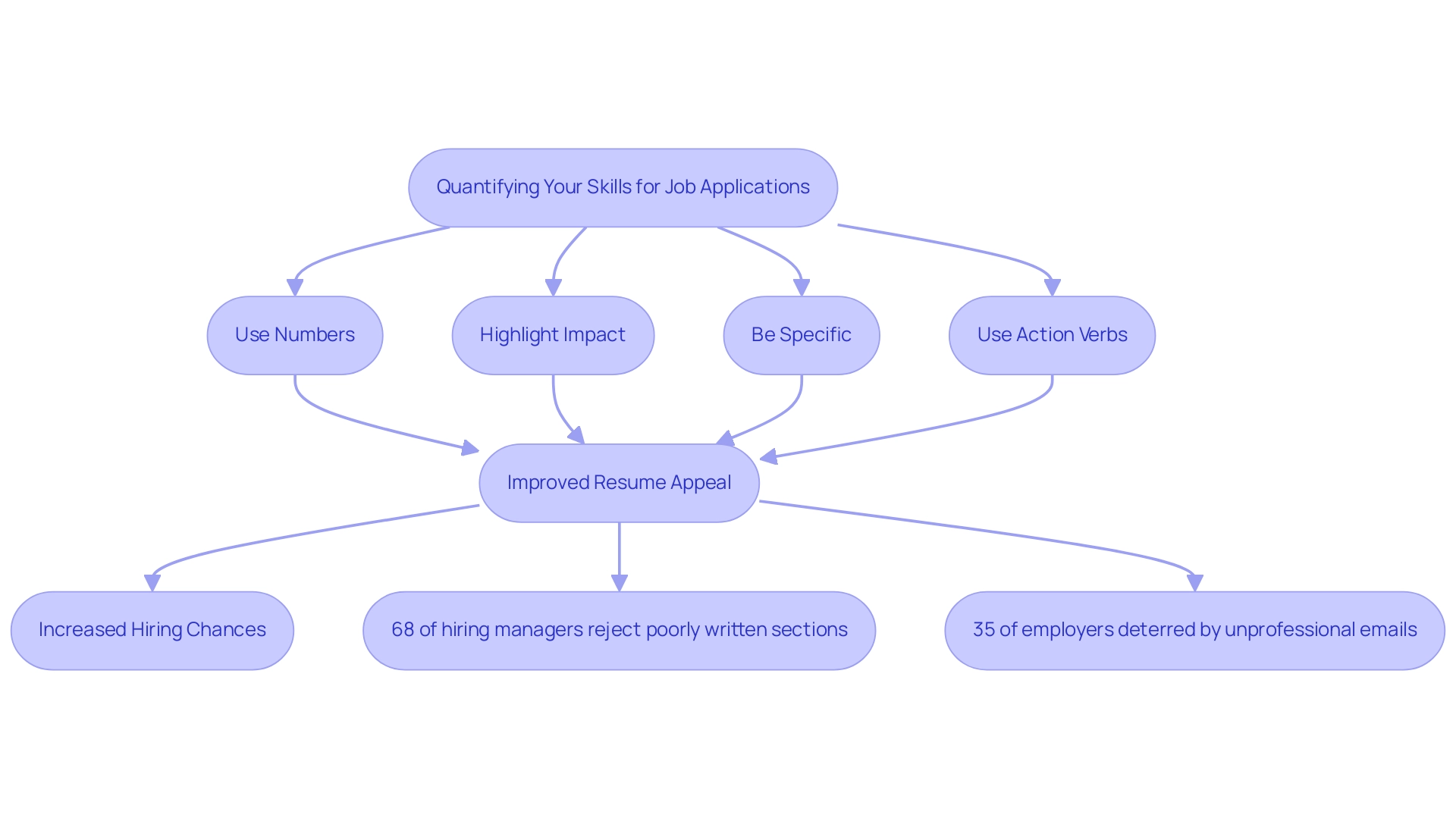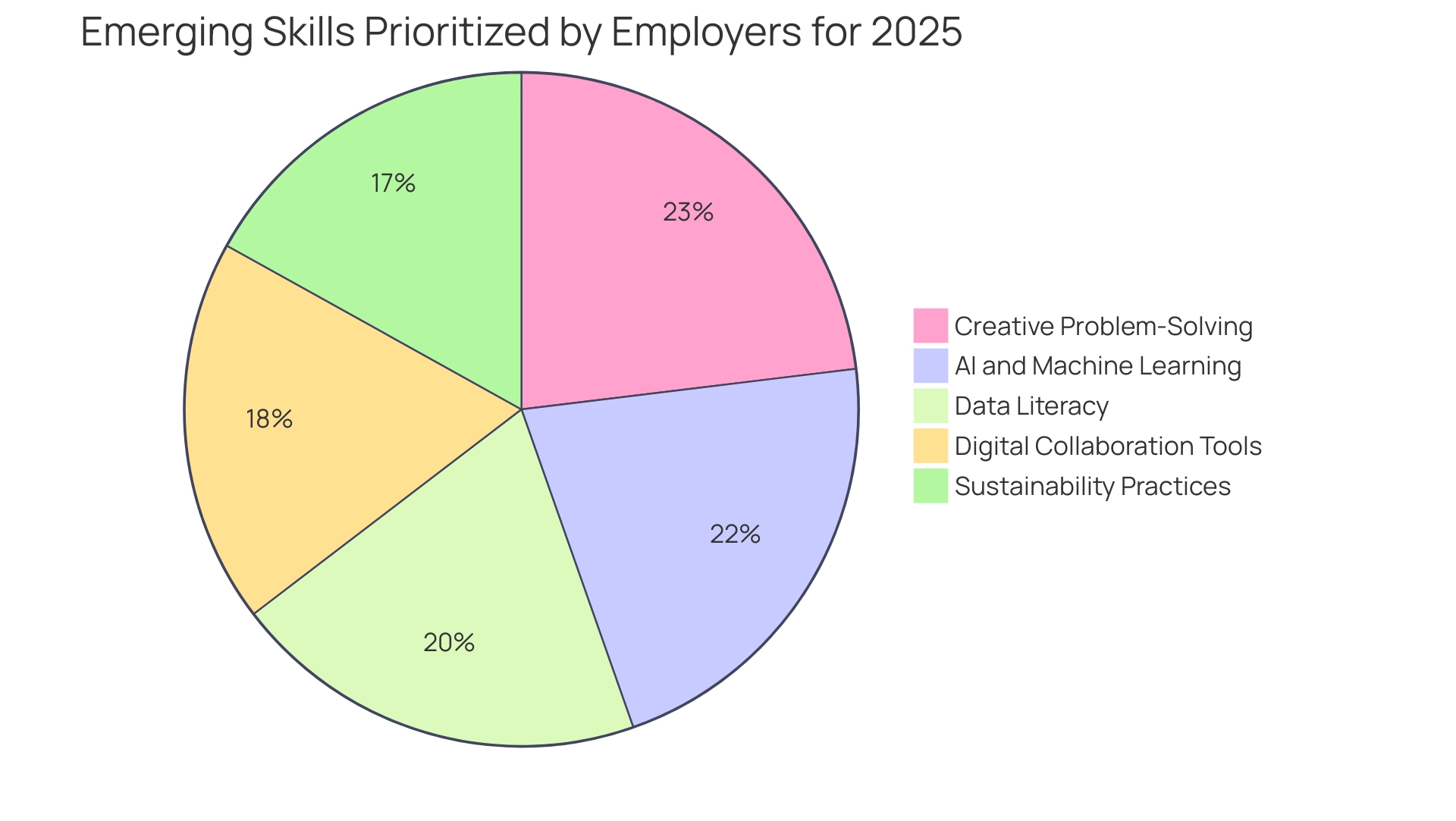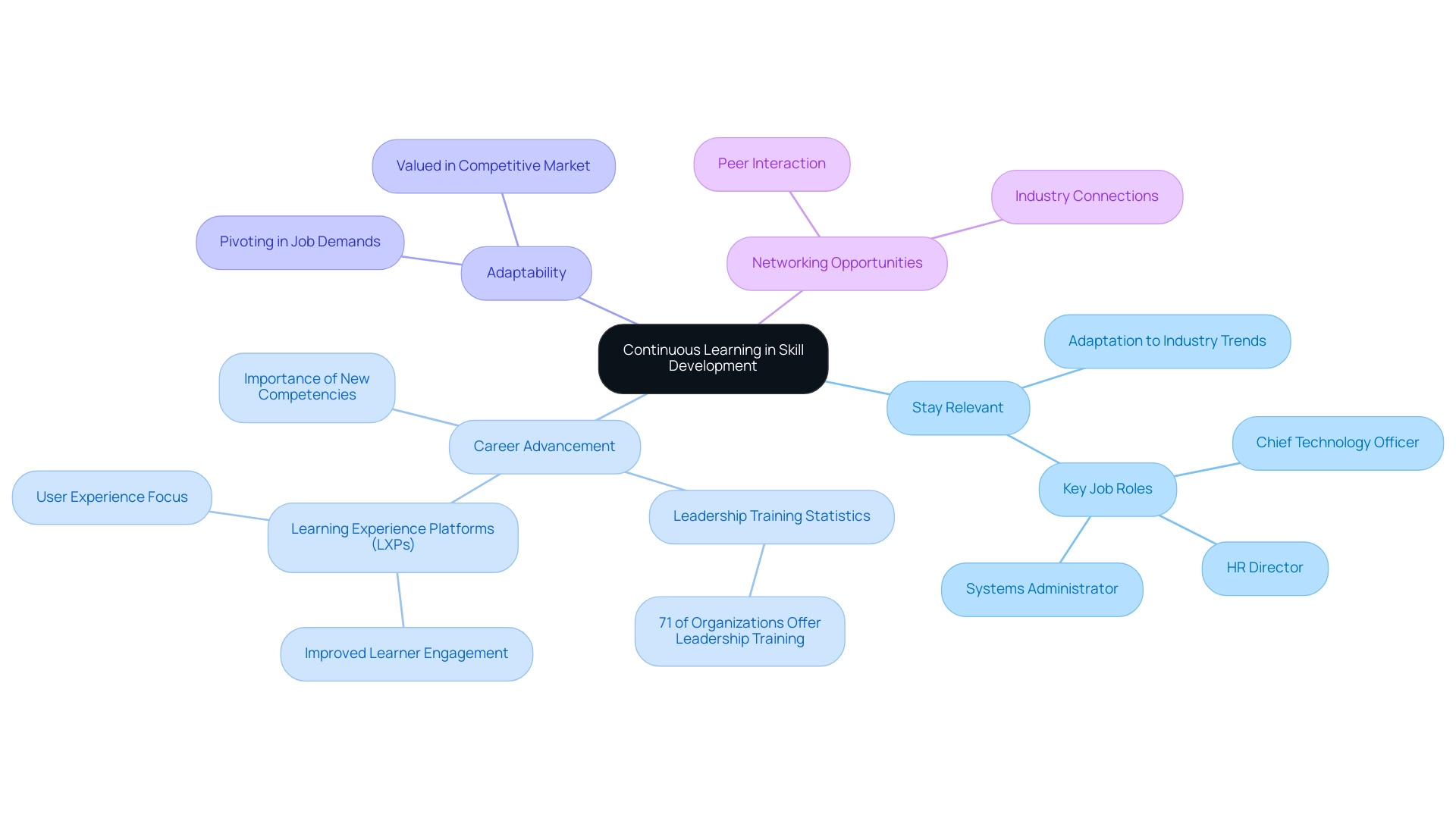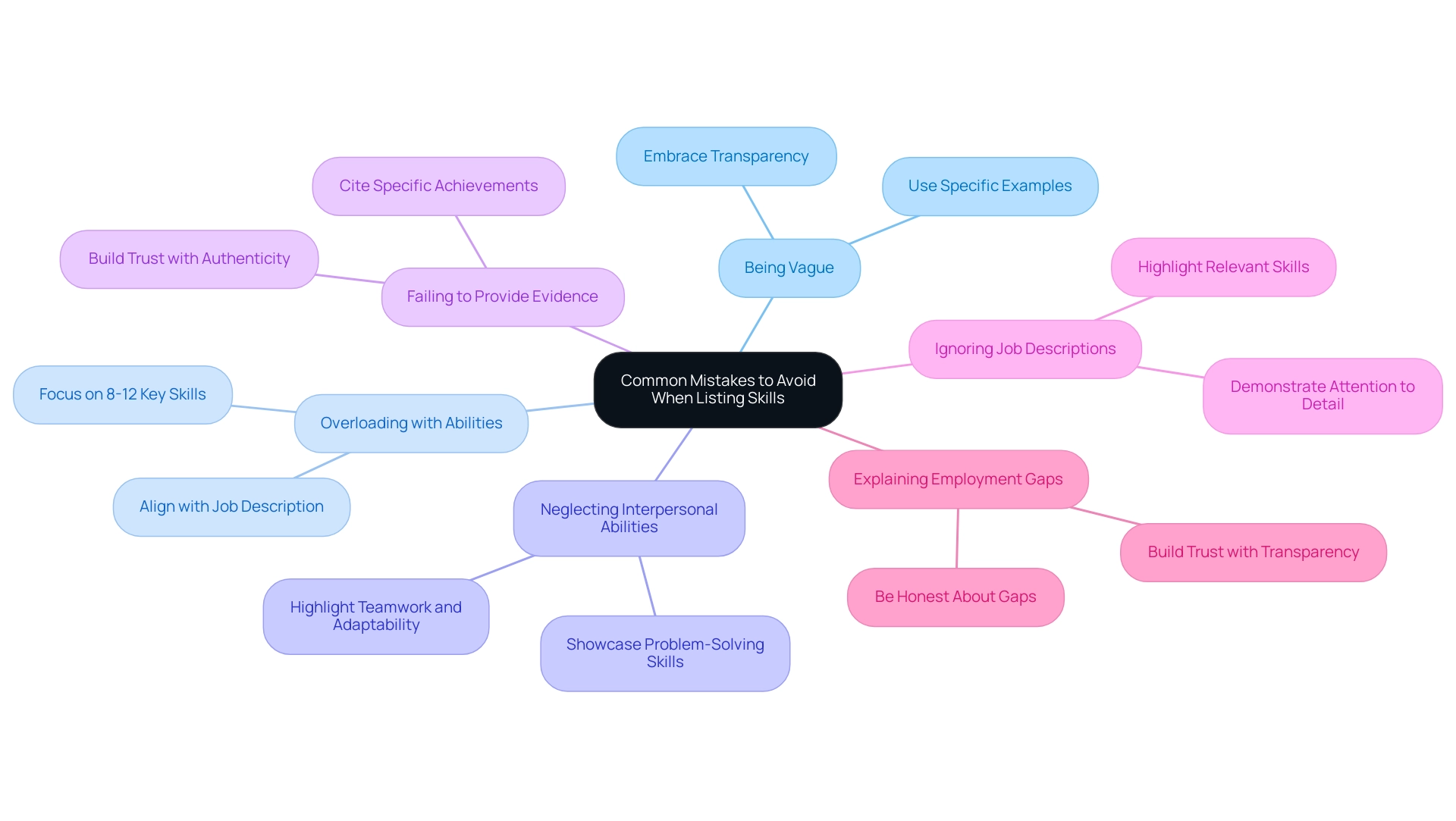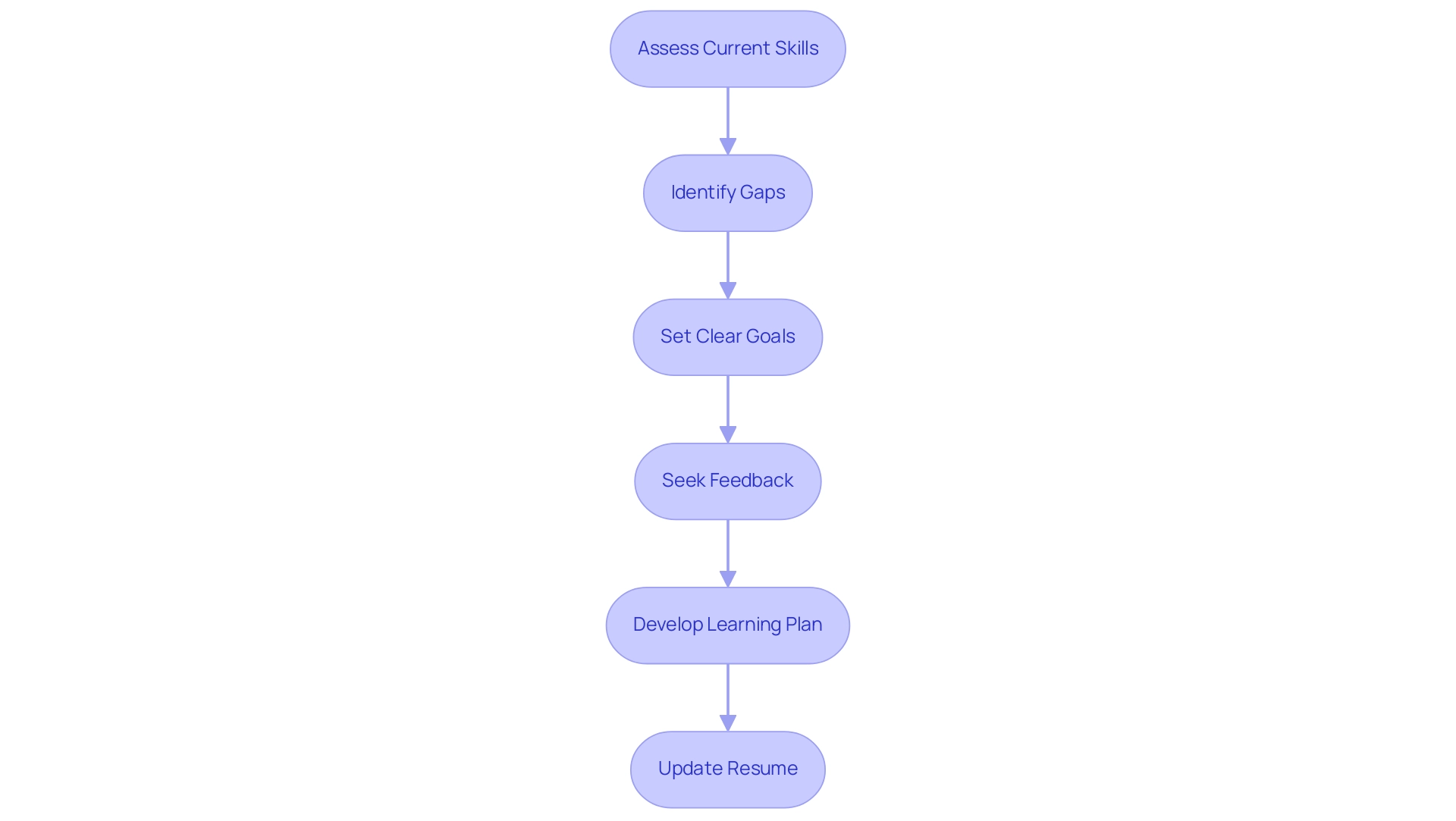Overview
In 2025, it is imperative to include essential skills on your resume that encompass both hard skills—such as data analysis and programming languages—and soft skills like communication and adaptability. These competencies are critical for career advancement in today’s competitive job market.
Aligning these skills with specific job descriptions and effectively showcasing them through quantifiable achievements can significantly enhance a candidate’s appeal to employers. This strategic approach not only demonstrates capability but also positions candidates favorably amidst recruitment challenges.
Key Highlights:
- Presenting exceptional skills on resumes is crucial for career advancement in 2025.
- Employers prioritize both technical and interpersonal skills during the hiring process.
- A well-organized skills section can enhance interview prospects by aligning competencies with company culture.
- 82% of resumes lack mention of side projects, presenting an opportunity for candidates to stand out.
- Top hard skills in demand include data analysis, cultural competence, programming languages, digital marketing, project management, and cybersecurity.
- Essential soft skills for career success include communication, teamwork, adaptability, problem-solving, and emotional intelligence.
- Effective strategies for highlighting skills on a resume include using bullet points, being specific, tailoring to job descriptions, and including context.
- Candidates should analyze job descriptions to align their skills and experiences with employer expectations.
- Quantifying achievements with metrics enhances resume effectiveness, making applications more appealing to hiring managers.
- Emerging skills for the future job market include AI and machine learning, data literacy, digital collaboration tools, sustainability practices, and creative problem-solving.
- Continuous learning is vital for skill development and career advancement, with 71% of organizations prioritizing leadership training.
- Common mistakes to avoid when listing skills include being vague, overloading with abilities, neglecting interpersonal skills, and failing to provide evidence.
Introduction
In the dynamic job market of 2025, the capacity to proficiently showcase skills on a resume has emerged as a pivotal element in career advancement. With employers increasingly prioritizing both hard and soft skills, candidates must adeptly navigate the intricacies of aligning their qualifications with job requirements to distinguish themselves in a competitive landscape.
This article explores the critical role of skills in the hiring process, emphasizing:
- Essential hard and soft skills
- Strategies for effectively presenting these skills on resumes
- The necessity of continuous learning in skill development
Through insights from industry experts and case studies, readers will uncover methods to elevate their employability and position themselves as compelling candidates in an increasingly demanding job market.
The Importance of Skills on Your Resume
In the competitive landscape of 2025, effectively presenting exceptional skills on your resume is crucial for career advancement. Great skills serve as a key indicator of your qualifications and your potential to drive an organization’s success. Employers increasingly depend on competencies as a primary filter during the hiring process, emphasizing the skills that encompass both technical and interpersonal abilities aligned with specific job descriptions.
A well-organized abilities section that highlights these skills can significantly enhance your prospects of obtaining an interview. It provides a concise summary of your competencies and how they align with the company culture. Notably, statistics reveal that 82% of resumes lack mention of side projects, with many focusing predominantly on education and work experience. This gap presents an opportunity for candidates to distinguish themselves by incorporating skills that demonstrate initiative and versatility.
Expert opinions emphasize that as hiring practices evolve, the focus on skills will only intensify. Ayesha Noor, a Content Marketer and Copywriter, notes, “53% of job seekers are the stars of their own video presentations!” This underscores the increasing trend of video applications, enabling applicants to showcase their personality and skills in an engaging manner, offering a distinctive path for differentiation in a saturated job market.
Moreover, case studies indicate that individuals who effectively communicate their skills—especially those that align with emerging industry trends—tend to have a higher success rate in securing interviews. The case study on developing video presentations reveals that this format not only enhances personal branding but also serves as an engaging approach for showcasing abilities, making applicants more memorable to prospective employers.
As technology continues to shape recruitment, showcasing skills will be paramount in influencing hiring decisions. In summary, prioritizing great skills on your resume not only enhances your personal branding but also positions you as a compelling candidate in the eyes of potential employers.
Top Hard Skills Employers Are Seeking
As we approach 2025, the job market is undergoing significant transformation, with employers increasingly prioritizing technical abilities that showcase proficiency and specialized knowledge. The following hard skills are particularly in demand:
- Data Analysis: The ability to interpret and analyze data is crucial across various industries. A recent survey indicates that 75% of employers are actively seeking individuals with strong data analysis capabilities, recognizing its essential role in informed decision-making and strategic planning.
- Cultural Competence: In today’s diverse business environment, cultural competence and intelligence are vital for effective communication and fostering inclusivity. Employers are looking for individuals who can navigate and respect diverse perspectives, thereby enhancing team dynamics and collaboration.
- Programming Languages: Proficiency in programming languages such as Python, Java, or SQL is highly sought after, particularly in technology-driven roles. As businesses continue to digitize their operations, the demand for skilled programmers is expected to rise significantly.
- Digital Marketing: Skills in search engine optimization (SEO), pay-per-click (PPC) advertising, and social media marketing are essential for marketing positions. With the digital marketplace expanding, employers are seeking individuals who can effectively navigate and leverage these platforms.
- Project Management: Familiarity with project management tools and methodologies is vital for operational roles. Employers are increasingly valuing individuals who can demonstrate their ability to lead projects efficiently and deliver results on time.
- Cybersecurity: As data breaches and cyber threats become more prevalent, expertise in cybersecurity is increasingly important. Organizations prioritize individuals who can safeguard sensitive information and ensure compliance with regulatory standards.
The focus on these technical abilities reflects a broader trend in the job market, where technical expertise is becoming a key differentiator for candidates. Case studies reveal that companies prioritizing data analysis expertise in their hiring processes have seen improved operational efficiency and enhanced decision-making capabilities. Uday Kumar, a graduate student and founder of the start-up KnotHastags, illustrates this point well: “Utilizing my education and the resources available to me has been crucial in developing the hard abilities necessary for my entrepreneurial ambitions.”
As the demand for these competencies continues to grow, job seekers must ensure their resumes highlight the essential skills to remain competitive in the evolving job market.
Essential Soft Skills for Career Success
In today’s competitive job market, where there is a war for talent, interpersonal abilities have emerged as crucial components for career success, complementing traditional hard expertise. Employers increasingly prioritize individuals who possess impressive skills to list on their resumes, including strong interpersonal abilities, effective communication, and adaptability in dynamic environments. Key soft skills that are essential for career advancement in 2025 include:
- Communication: The ability to articulate ideas clearly and persuasively is paramount. Effective communicators can convey complex information in an understandable manner, fostering collaboration and reducing misunderstandings.
- Teamwork: The capacity to work harmoniously with others is vital. Successful individuals demonstrate impressive skills to list on their resumes by excelling in collaborative environments, contributing to shared goals and enhancing team dynamics.
- Adaptability: Flexibility in the face of change is a prized trait. Professionals who possess impressive skills to list on their resumes, such as the ability to pivot and adjust to new challenges, are better equipped to thrive in evolving workplaces.
- Problem-Solving: Analytical thinking and creativity in addressing issues are essential. Employers are looking for individuals with impressive skills to list on their resumes, who can identify problems and devise innovative solutions that drive progress.
- Emotional Intelligence: The ability to recognize and manage one’s own emotions, as well as those of others, is increasingly valued. Having high emotional intelligence is one of the impressive skills to list on a resume, as it fosters positive workplace relationships and enhances team cohesion. Notably, statistics reveal that 90% of top performers possess high emotional intelligence, underscoring its significance in hiring decisions.
Moreover, as applicants navigate various job offers, hiring managers are emphasizing interpersonal abilities as impressive skills to list on their resumes, acknowledging that these competencies contribute to enhanced team performance and dynamics. As Eric Eddy pointed out, Boutique Recruiting’s capacity to provide high-quality candidates swiftly and effectively underscores the significance of these abilities in hiring practices. Organizations that prioritize interpersonal abilities, which are impressive skills to list on their resumes, in their hiring processes are likely to see improved collaboration and overall effectiveness within their teams.
The case study titled ‘The Role of Interpersonal Abilities in Hiring’ illustrates that hiring managers increasingly recognize the vital role of interpersonal abilities, with many emphasizing their importance over traditional qualifications. As the landscape of work continues to evolve, impressive skills to list on resumes, such as the ability to communicate effectively and work well with others, will remain indispensable for career success. Moreover, leaders must prioritize training and development to engage teams effectively, further highlighting the broader implications of interpersonal abilities in workplace dynamics.
In this context, it is essential for candidates to explore all available opportunities and for companies to ensure a seamless interview process to attract and retain top talent.
How to Effectively Highlight Your Skills on a Resume
To effectively highlight your abilities on a resume in 2025, consider implementing the following strategies:
- Use Bullet Points: Organizing your competencies in bullet points enhances readability, allowing hiring managers to quickly scan your qualifications.
- Be Specific: Avoid vague descriptors; instead, specify your expertise clearly. For example, state ‘Proficient in Adobe Creative Suite’ instead of just ‘Graphic Design’ to express your expertise more effectively.
- Tailor to the Job: Customize your abilities section for each application. Align your abilities with the job description to demonstrate your suitability for the role, which can significantly increase your chances of being noticed. This customized method reflects the individualized recruitment tactics highlighted by Boutique Recruiting, which concentrate on authentic relationships and comprehending company culture.
- Include Context: Whenever possible, provide context for your expertise by detailing how you applied it in previous roles. This not only showcases your capabilities but also illustrates your impact in past positions, reinforcing the importance of a well-crafted document that effectively presents great skills to list on resume, resonating with both recruiters and hiring managers.
- Prioritize Relevant Skills: List the most relevant skills first to capture the employer’s attention immediately. This strategic placement ensures that the key competencies are seen right away, making a strong first impression.
In 2025, statistics reveal that 53% of job seekers are utilizing video presentations, highlighting the importance of standing out in a competitive job market. Additionally, 42% of recruiters are leveraging social media to evaluate applicants, as noted by Ayesha Noor, a Content Marketer and CopyWriter. This highlights the need for a polished and tailored document that reflects your skills effectively.
A case study on Boutique Recruiting illustrates the importance of a meticulous approach in recruitment. By concentrating on establishing enduring connections and comprehending company culture, the firm effectively provides individuals who not only fulfill technical qualifications but also integrate well within the organizational environment. This strategy results in successful placements, reinforcing the importance of a well-crafted document that resonates with both recruiters and hiring managers.
Applicants can take a cue from Boutique Recruiting’s approach by customizing their applications to showcase not only their abilities but also how they fit with the company culture of the roles they are pursuing.
Furthermore, individuals should be mindful of warning signs during the interview process, such as disorganization, lack of clarity, or inappropriate remarks from interviewers, which can suggest potential problems within the organization. By adhering to these best practices for showcasing your great skills to list on resume, you can improve your opportunities for obtaining interviews and progressing your career in 2025. Boutique Recruiting’s impressive track record of success and numerous satisfied clients and candidates further underscores the effectiveness of these strategies, making it clear that a thoughtful approach to resume crafting can yield significant results.
Tailoring Your Skills to Match Job Requirements
Tailoring your skills to align with job requirements is crucial for distinguishing yourself in the competitive application landscape of 2025. Did you know that since 2015, the expertise required for jobs has evolved by approximately 25%, with projections indicating a potential increase to 50% by 2027? This shift highlights the necessity for applicants to remain agile and responsive to changing job market demands. Here’s a strategic approach to effectively showcase your competencies:
- Analyze Job Descriptions: Begin by meticulously reviewing job postings to identify key terms and essential abilities. This analysis will assist you in grasping what employers value.
- Align Your Abilities: Ensure that your abilities correspond with those emphasized in the job description. Use comparable terminology to establish a direct link between your qualifications and the employer’s requirements.
- Highlight Relevant Experience: Emphasize experiences that showcase your abilities in action, especially those that are directly relevant to the role. This not only showcases your capabilities but also illustrates your practical application of those skills.
- Adjust for Each Application: Customize your curriculum vitae for every job application. Tailoring your application to highlight the most relevant abilities and experiences enhances your likelihood of standing out.
The importance of aligning abilities with job descriptions cannot be overstated. Incorporating strong skills into your resume enhances your visibility and aligns with the expectations of hiring managers. Boutique Recruiting specializes in custom recruitment solutions for technical and HR roles, including positions such as Chief Technology Officer, Engineer, Solution Architect, and HR Generalist, across various industries. Our searches are uniquely tailored to meet the specific needs of companies, ensuring that applicants are matched with the precise requirements of employers.
The firm has an impressive track record of success, characterized by numerous satisfied clients and applicants, establishing it as a trusted recruiting partner. For instance, Eric Eddy from CPA Resources Global Professionals noted the firm’s ability to deliver top-notch candidates quickly and efficiently, reinforcing the importance of aligning expertise to job requirements.
Additionally, a case study revealed that job postings made early on Monday mornings attracted significantly more candidates, highlighting the importance of timing and relevance in recruitment strategies. By aligning your abilities with the job requirements, you position yourself as a strong contender in the hiring process, ultimately leading to successful job applications. Contact us to learn more.
Quantifying Your Skills: Showcasing Achievements with Metrics
Measuring your abilities can significantly enhance your resume by identifying great skills to list, making it stand out to potential employers. Consider these effective strategies:
- Use Numbers: Incorporate specific figures to illustrate your achievements. For instance, stating ‘Increased sales by 20% in six months’ not only showcases your success but also offers a clear metric for evaluation.
- Highlight Impact: Emphasize the positive effects of your abilities on previous employers. For example, you might say, ‘Reduced project completion time by 15% through effective team management,’ showcasing your ability to drive results.
- Be Specific: Provide concrete metrics that relate directly to your skills. This could include revenue generated, costs saved, or improvements in efficiency, which can significantly bolster your credibility.
- Use Action Verbs: Begin bullet points with strong action verbs to convey your contributions dynamically. This approach not only captures attention but also clearly conveys your role in achieving results.
The effect of metrics on application effectiveness cannot be overstated. Research indicates that applications featuring quantifiable achievements are more likely to catch the attention of hiring managers. In fact, 68% of hiring managers report that a poorly written education section can lead to rejection, underscoring the importance of clarity and precision in your application.
Additionally, more than 80% of applications in the US are rejected because the candidate included their picture, highlighting common pitfalls in job application writing that should be avoided.
Furthermore, a case study revealed that candidates using professional email addresses significantly improved their chances of being hired, as 35% of employers noted that unprofessional emails negatively impacted their hiring decisions. This highlights the broader principle that attention to detail and professionalism in all aspects of your application can improve your prospects.
In 2025, as the average length of job applications trends towards 1.6 pages, with a preference for two-page documents by 90% of recruiters, it is crucial to make every word count. By measuring your abilities and accomplishments, you not only showcase your worth but also identify great skills to list on your resume that align with the expectations of today’s hiring landscape. For additional support, consider utilizing resources like Resume Genius, which has been simplifying the job hunt since 2009.
Emerging Skills for the Future Job Market
As the job market continues to evolve, certain abilities are emerging as essential for future success. The following competencies are increasingly sought after by employers in 2025:
- AI and Machine Learning: Proficiency in AI technologies is becoming crucial across various sectors, with a significant rise in demand for professionals who can harness these tools to drive innovation and efficiency. In fact, a recent survey indicates that 70% of hiring managers prioritize individuals with AI and machine learning skills, reflecting the growing integration of these technologies in business operations.
This trend is particularly important as hiring managers face challenges in finding top talent due to the trend of top-grading, which focuses on retaining high performers.
- Data Literacy: The ability to interpret and leverage data for informed decision-making is paramount. As organizations increasingly rely on data-driven strategies, individuals who can analyze and utilize data effectively will stand out. Reports indicate that 65% of employers are seeking individuals who can demonstrate strong data literacy skills.
- Digital Collaboration Tools: With the rise of remote work, proficiency in digital collaboration tools has become vital. Skills in platforms that facilitate teamwork and communication are essential for maintaining productivity in a distributed workforce. A study found that 60% of companies are prioritizing applicants with experience in these tools.
- Sustainability Practices: Knowledge of sustainable practices is gaining traction as organizations strive to meet environmental goals. Candidates who understand sustainability principles and can implement them within their roles are increasingly attractive to employers. Statistics reveal that 55% of hiring managers consider sustainability knowledge a key differentiator in candidates.
- Creative Problem-Solving: The ability to think creatively and tackle complex challenges is highly valued. Employers are seeking individuals who can approach problems from innovative angles and develop effective solutions. Expert opinions suggest that creative problem-solving will be a critical ability for career success in the coming years, with 75% of employers emphasizing its significance in their hiring criteria.
Boutique Recruiting, specializing in roles such as Chief Technology Officer, Engineer, Solution Architect, Systems Administrator, and HR positions, exemplifies the importance of these abilities in the recruitment process. By conducting personalized searches designed for the distinct requirements of businesses in different sectors, Boutique Recruiting guarantees that applicants not only have these crucial competencies but also correspond with the particular expectations of the positions for which they are seeking. As Eric Eddy from CPA Resources Global Professionals pointed out, the firm’s capability to provide high-quality individuals promptly and effectively highlights the importance of matching applicant expertise with market requirements.
Furthermore, Boutique Recruiting sets itself apart by concentrating on establishing enduring relationships and delivering personalized service throughout the recruitment process, ensuring that individuals not only meet technical qualifications but also integrate well within the organizational environment. These developing abilities not only improve an applicant’s employability but also correspond with the changing requirements of the job market, highlighting them as great skills to list on a resume for 2025. Contact us to learn more.
The Role of Continuous Learning in Skill Development
In today’s dynamic job market, ongoing education is vital for preserving and enhancing your abilities, especially as companies like Boutique Recruiting strive to connect top talent with the right opportunities. Here’s why:
- Stay Relevant: In an ever-evolving landscape, continuous learning empowers professionals to keep pace with industry trends and technological advancements. This adaptability is crucial as organizations increasingly seek individuals capable of managing change efficiently, particularly in technical and HR roles such as Chief Technology Officer, HR Director, and Systems Administrator.
Regularly refreshing your expertise is essential to boost employability and helps you cultivate valuable skills to list on your resume, significantly increasing your appeal to prospective employers. In fact, statistics reveal that 71% of organizations prioritize leadership training as a standard practice for career development, underscoring the importance of ongoing education in enhancing employability. Boutique Recruiting’s personalized searches are tailored to meet the specific requirements of businesses, ensuring that candidates possess the relevant skills to align with industry demands.
- Career Advancement: Acquiring new competencies, which are essential skills to showcase on your resume, can unlock pathways to promotions and new opportunities. Companies investing in Learning Experience Platforms (LXPs) report improved learner engagement, correlating with higher employee satisfaction and retention rates. As Eric Eddy noted, Boutique Recruiting’s capability to deliver top-notch individuals swiftly and efficiently emphasizes the significance of continuous learning in the recruitment process, ensuring applicants are well-prepared for the demands of their roles.
- Adaptability: Continuous learning fosters adaptability, equipping individuals to pivot in response to shifting job demands. This quality is increasingly valued in a competitive employment market, where the ability to learn and develop is paramount, particularly as candidates now question companies just as much as they are being questioned. The ongoing ‘war for talent’ necessitates that organizations proactively attract and retain top candidates.
- Networking Opportunities: Engaging in learning environments not only enhances your skills but also expands your professional network. Interacting with peers and industry leaders during training sessions can forge valuable connections that may advance your career.
The impact of continuous learning on employability is further illustrated by case studies showing that organizations embracing personalized and data-driven training programs witness marked improvements in employee performance and engagement. For instance, the trend toward more data-driven and personalized sales training programs reflects the evolving landscape of continuous learning, particularly relevant to the financial sector. As the global LXP market continues to expand, it becomes evident that investing in continuous learning is not merely advantageous but essential for career advancement in 2025 and beyond. Boutique Recruiting assists employers struggling to identify suitable candidates in a competitive job market, emphasizing the necessity for candidates to remain competitive through continuous learning.
Common Mistakes to Avoid When Listing Skills
When crafting your resume, it’s essential to avoid common pitfalls in the skills section:
- Being Vague: Generic phrases like ‘good communication skills’ lack impact. Instead, provide specific examples that illustrate how you’ve effectively communicated in past roles. Embrace transparency by being forthcoming about your workstyle preferences, including your desired work arrangement, such as hybrid, on-site, or remote, and how they align with the role.
- Overloading with Abilities: Rather than enumerating every capability you possess, concentrate on 8-12 key skills that align with the job description. This targeted approach not only enhances the readability of your resume but also highlights your most pertinent qualifications, effectively showcasing your genuine self.
- Neglecting Interpersonal Abilities: While technical capabilities are important, interpersonal attributes such as teamwork, adaptability, and problem-solving are equally vital. In fact, many hiring managers prioritize these traits, as they often determine how well a candidate will fit within a company culture. Being honest about your motivations and personal insights can further enhance this connection.
- Failing to Provide Evidence: Always substantiate your abilities with concrete examples or achievements. For instance, instead of merely stating you possess project management expertise, mention a specific project you led and the successful outcomes achieved. This level of authenticity helps build trust with potential employers.
- Ignoring Job Descriptions: Neglecting job descriptions can hinder your ability to highlight relevant skills that align with the specific requirements outlined in the job posting. This not only demonstrates your attention to detail but also shows that you understand the employer’s needs. Presenting your genuine self is a powerful technique that can make a lasting impression.
- Explaining Employment Gaps: If there are any gaps in your employment history, be prepared to explain them honestly. This transparency is crucial for building trust with hiring managers and shows your willingness to address potential concerns.
In 2025, the job search landscape is evolving, with personal branding and social media becoming increasingly significant in evaluating applicants. As Eva Chan, a Senior Digital PR Writer and Certified Professional Resume Writer, emphasizes, “Adapting to the latest trends in the career space is crucial for professionals to stand out in a competitive job market.” Candidates must align their strategies with these trends.
Significantly, statistics indicate that 75% of hiring managers have discovered a falsehood in a job application, highlighting the importance of integrity and precision in your abilities presentation. Moreover, men generally enumerate an average of 15 abilities on their resumes, in contrast to 13 for women, emphasizing a possible area for enhancement in how applicants showcase their qualifications. The case study ‘Resume Predictions for 2025’ indicates that as personal branding becomes crucial, candidates should focus on showcasing their unique value propositions.
By avoiding these common mistakes and concentrating on a well-rounded ability set, you can enhance your chances of making a strong impression on potential employers.
Reflecting on Your Skills: A Path to Career Advancement
Reflecting on your abilities is crucial for career advancement in 2025. Begin with a comprehensive assessment of your current skills. Identifying gaps is essential, as research indicates that the median competence loss ratio across companies underscores the necessity of continuous competency evaluation. Organizations that fail to adapt may find themselves at a competitive disadvantage in the job market.
Next, establish clear and achievable goals for your development. Align these objectives with your career aspirations to ensure your efforts are directed towards roles that will enhance your professional trajectory.
Engaging with mentors or peers for feedback can provide valuable insights into your strengths and areas for improvement. Constructive feedback illuminates blind spots and helps you focus on in-demand skills, particularly those required in roles that involve human interaction, which are projected to grow significantly, comprising two-thirds of the workforce according to Deloitte.
Develop a structured learning plan for acquiring new abilities. This could involve enrolling in courses, attending workshops, or pursuing self-study. Companies that invest in training expect enhanced productivity (77%) and improved competitiveness (70%), highlighting the value of continuous learning. Additionally, assessing the ROI of learning initiatives can assist organizations in retaining top talent and fostering internal mobility.
As you acquire new competencies, regularly update your resume to reflect these skills. This not only showcases your growth but also positions you favorably in the eyes of potential employers. Incorporating these steps into your career development strategy can significantly enhance your prospects for advancement. For instance, Visa’s adoption of AI-driven training in their sales program resulted in a remarkable 78% boost in sales confidence among their teams, demonstrating the tangible benefits of development initiatives. By prioritizing skill assessment and development, you can navigate your career path more effectively and position yourself as a valuable asset in your field.
Conclusion
In the dynamic job market of 2025, effectively showcasing both hard and soft skills on a resume is crucial for career advancement. Recognizing the significance of these skills not only boosts employability but also aligns candidates with the expectations of hiring managers. Essential hard skills such as:
- Data analysis
- Programming
- Cybersecurity
are increasingly in demand, while soft skills like:
- Communication
- Teamwork
- Emotional intelligence
are becoming vital for success in collaborative work environments.
To present skills effectively—whether through tailoring resumes to specific job descriptions or quantifying achievements—candidates can distinguish themselves in a competitive landscape. Continuous learning emerges as a key theme, underscoring the necessity for professionals to adapt and grow in response to changing industry demands. By proactively enhancing their skill sets, candidates can meet the expectations of potential employers and position themselves for long-term career success.
Ultimately, the central takeaway is that in 2025, a well-crafted resume that thoughtfully highlights relevant skills can be transformative. Candidates who prioritize skill development and articulate their qualifications with clarity and precision will stand out in the hiring process. As the job market continues to evolve, embracing these principles will be essential for anyone seeking to advance their career and secure their place in an increasingly competitive environment.
Frequently Asked Questions
Why is it important to showcase skills on a resume in 2025?
In 2025, effectively presenting exceptional skills on a resume is crucial for career advancement as employers increasingly depend on competencies as a primary filter during the hiring process. Skills serve as key indicators of qualifications and the potential to drive an organization’s success.
What types of skills should be highlighted on a resume?
Candidates should highlight both technical skills, such as data analysis, programming languages, digital marketing, and cybersecurity, as well as interpersonal skills, including communication, teamwork, adaptability, problem-solving, and emotional intelligence.
What is the significance of including side projects on a resume?
Statistics reveal that 82% of resumes lack mention of side projects, which presents an opportunity for candidates to distinguish themselves by incorporating skills that demonstrate initiative and versatility, enhancing their prospects of obtaining an interview.
How do video applications impact the hiring process?
Video applications allow job seekers to showcase their personality and skills in an engaging manner, providing a distinctive path for differentiation in a saturated job market, as highlighted by expert opinions.
What hard skills are particularly in demand by employers?
Key hard skills in demand include data analysis, cultural competence, programming languages, digital marketing, project management, and cybersecurity, reflecting the evolving needs of the job market.
Why are interpersonal skills important for career success?
Interpersonal skills, such as effective communication, teamwork, adaptability, problem-solving, and emotional intelligence, are increasingly prioritized by employers as they contribute to enhanced team performance and collaboration.
What role does emotional intelligence play in hiring decisions?
Emotional intelligence is significant in hiring decisions, with statistics indicating that 90% of top performers possess high emotional intelligence, which fosters positive workplace relationships and enhances team cohesion.
How can candidates improve their chances of securing interviews?
Candidates can improve their chances by effectively communicating their skills, particularly those that align with emerging industry trends, and by presenting a well-organized abilities section on their resumes.
